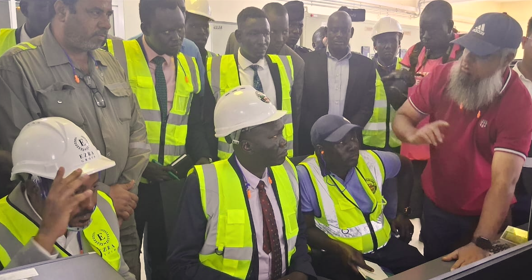South Sudan’s Minister of Energy and Dams, Agok Makur Kur, has pledged to expand electricity supply across Juba and other parts of South Sudan, citing both short-term and long-term plans to address persistent power shortages.
Kur made the remarks on Thursday during a visit to the Ezra Power Plant in Gondokoro, operated by the Israel Pact Group, where he said the visit was part of his initial engagements since assuming office.
“I came to visit the Israel Pact Group, and as the new Minister of Energy and Dams, I have a plan. We have a short plan and also a long plan. The short plan is to visit this area and to visit other areas in South Sudan,” he said. “Also in our plan, I am going to open the power plant in Rumbek in the coming month.”
Kur said he received a briefing from the management of the Israel Pact Group on the current production and capacity of the Ezra Power Plant.
“Also, I got a full enlightenment from the manager of Israel Group in this area, and also I got information that 79MW is in use, and there remains 21MW, and Israel Group promised me that they can complete this 21Mw in the coming month or year,” he stated.
The minister further revealed that plans to import power from Uganda are underway and that this will improve electricity access in several towns.
“As you know now, power transmission from Uganda has come to Nimule, and I hope that Nimule is covered, and it will come all the way to Juba soon,” he said. “As a ministry, we prepared ourselves to cooperate with Uganda for this transmission of energy to Juba and other South Sudanese towns.”
The minister assured that Juba will soon be fully covered by an electricity supply and acknowledged the hardships faced by citizens due to limited access to power.
Kur emphasized the importance of electricity not only for lighting but also for security and economic activities, citing developments at the border town of Nimule.
For his part, Samson Ezra, the managing director of Ezra Group, commended President Salva Kiir for appointing Kur to head the Ministry of Energy and Dams, describing the appointment.
“I want to appreciate President Kiir for this appointment, because this ministry had no minister. This visit will encourage the team to work hard and ensure the challenges we are having are handled,” he said. “Together with the new minister, I am sure we shall connect the rest of Juba.”
To connect the whole of Juba, Ezra said his team has embarked on producing concrete poles in big numbers.
The visit to the Ezra Power Plant marks one of the minister’s first field engagements as he begins consultations aimed at improving electricity generation and distribution across South Sudan.




